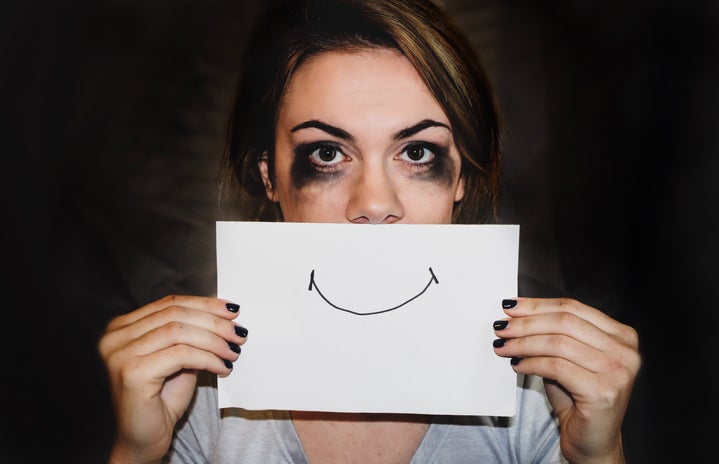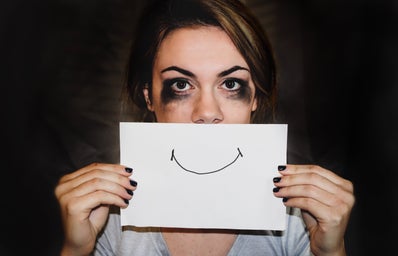In recent years, there’s been incredible progress in normalizing and recognizing the importance of self-care, self-love, and expanding body representation. Social media is filled with inspiring influencers that constantly remind their followers that they are beautiful and worthy no matter what. My TikTok FYP is filled with videos of daily affirmations to say in the mirror when you’re feeling down. All of this is wonderful, but after so much exposure to this “always positive” mindset, I find myself wondering if it’s possible to have too much of a good thing.
Here’s why: With these advancements came along what many people are calling “toxic positivity”.
Toxic Positivity: Rejecting negative emotions through responses of false reassurance instead of addressing the root of negativity.
Megan’s Definition
There’s a whole range of emotions that we’re bound to experience when it comes to our self-image. In the effort that we’ve all taken to eradicate unnecessary negativity in our lives, did we maybe girlboss a little too close to the sun and instead form a habit of brushing aside our valid feelings with disingenuous mantras? It’s normal to feel unhappy, angry, or depressed. And a lot of the time, these are just secondary emotions to the root of the problem.
references in pop culture
Back in January, I excitedly sat down to watch episode two of the second season of HBO’s Euphoria. While I had originally started the episode with anticipation and curiosity about all of the drama set up in episode one, an unexpected scene stopped me in my tracks for its brilliance and relatability. Kat is in her room struggling with feelings of self-hatred and her relationship with Ethan. Suddenly, she becomes surrounded by these hallucinations of influencers telling her how beautiful and worthy she is. To no avail, she tries telling them that this doesn’t help the fact that she hates herself. Soon she becomes bombarded by women screaming at her to love herself over and over again until she reaches a breaking point.
Do you ever feel like the whole world is screaming at you to love yourself? I think a lot of us can relate to Kat and her struggle to find solace in the current intensity of the self-help movement. From birth, women are told how they should act, think, dress, and more. So is it shocking that blanket statements of self-worthiness don’t address deep-rooted issues ingrained into women? Does this method actually help undo years of curated insecurities forced upon us?

what might actually work
Take stretch marks, for example. We’ve gone our whole lives looking at magazines where they’ve been photoshopped out and watching commercials for creams and medicines that will get rid of these normal developments in our bodies. Now, we’re supposed to look in the mirror and say that we love our stretch marks and that they’re beautiful. Are we going to believe ourselves when for so long the media has enforced the opposite? I’m not sure that a lot of us do. We must look towards the foundation of this insecurity and realize that it was created by men who preferred pre-pubescent body types with complete disregard for the real human body. Many women have these coming-of-age stripes, so maybe we’ll see more progress in ourselves by unlearning thoughts instead of bandaging them up with others.
Fighting fire with a flamethrower is pretty ineffective. If we want to tackle these strong negative feelings, combating them with equally strong positive ones without first addressing the origin of the issue, might lead us right back to where we started. No matter how many seeds you plant, you won’t grow flowers if the soil is still toxic.
“No matter how many seeds you plant, you won’t grow flowers if the soil is still toxic.”
you’re valid!
You’re not a bad feminist for feeling bad about yourself; you’re a human being. It’s normal. It’s common. It’s acceptable! But it’s not meant to last forever. You CAN improve, it just requires some unlearning to get there. THEN when we look in the mirror and say “I love you. You’re worth it.” We’ll know it’s true. It always has been true— we just needed to put in the work to believe it.
I think it should be a priority for everyone to get to a place where they can experience positivity. It’s unrealistic to imagine that we’ll feel like that every day, but among our valleys, we all deserve some peaks. While the self-help movement certainly has its intentions in the right place, the methods we are currently using to achieve these feelings of self-worth may actually be harming us, or at the very least are not the most effective way to reach our desired destination of self-acceptance. I think we can do better because we deserve better.



